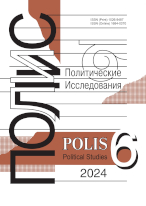The U.S. Sanctions Against Iran:
Experience and Eventual Implications
Timofeev I.N.,
Associate Professor of the Department of Political Theory, MGIMO University; Program Director, Russian International Affairs Council (RIAC), itimofeev@russiancouncil.ru
elibrary_id: 236879 | ORCID: 0000-0003-1676-2221 |
DOI: 10.17976/jpps/2018.04.05
Timofeev I.N. The U.S. Sanctions Against Iran: Experience and Eventual Implications. – Polis. Political Studies. 2018. No. 4. https://doi.org/10.17976/jpps/2018.04.05
The article is focused on the U.S. policy of economic sanctions against Iran. The topic has become a burning issue again after the U.S. withdrawal from the Joint Comprehensive Plan of Actions (JCPOA), also known as Iranian nuclear deal. American U-turn on JCPOA means a new wave of sanctions against Iran. It raises the question of future efficiency of sanctions in terms of their ability to make Iran comply with key U.S. political demands. More fundamental question is the one of why sanctions are effective in some cases or periods, while they are useless in the others? Why does a target state comply or resist to comply with the requirements of initiators? We base our hypothesis on the results of the quantitative research of Navin Bapat and his colleagues who used TIES data on 888 sanctions episodes and revealed significance of such factors as sanctions’ damage to economy and the existence of initiators’ coalition. We assume that the success of sanctions is determined by these two conditions among other factors. We examine this hypothesis learning the case of Iran using sanctions’ legislation as a key source. We conclude that in the Iranian case the relation between the damage of sanctions and their political efficiency is non-linear and is well described in terms of “Daniel Drezner’s sanctions paradox” – in case of sanctions against political foes, stronger sanctions do not provide proportionally strong results. We also find a critical role of initiators’ coalition and its sustainability on the efficiency of sanctions. Our analysis predicts poor efficiency of the U.S. sanctions after the withdrawal from JCPOA.
References
Allen S. The Determinants of Economic Sanctions Success and Failure. – International Interactions. 2005. Vol. 31. No. 2. P. 117-138. https://doi.org/10.1080/03050620590950097
Bapat N., Tobias H., Kobayashi Yo., Morgan C. Determinants of Sanctions Effectiveness: Sensitivity Analysis Using New Data. – International Interactions. 2013. Vol. 39. No. 1. Р. 79-98. https://doi.org/10.10 80/03050629.2013.751298
Bonetti Sh. Distinguishing Characteristics of Degrees of Success and Failure in Economic Sanctions Episodes. – Applied Economics. 1998. Vol. 30. No. 6. P. 805-813. https://doi.org/10.1080/000368498325507
Brzoska M. International Sanctions Before and Beyond UN Sanctions. – International Affairs. 2015. Vol. 96. No. 6. P. 1339-1349. https://doi.org/10.1111/1468-2346.12449
Chao J., Kaempfer W., Lowenberg A. Instrument Choice and the Effectiveness of Economic Sanctions: A Simultaneous Equations Approach. – Journal of Peace Research. 2003. Vol. 40. No. 5. P. 519-535. https://doi.org/10.1177/00223433030405002
Drezner D. Targeted Sanctions in a World of Global Finance. – International Interactions. 2015. Vol. 41. No. 4. Р. 755-764. https://doi.org/10.1080/03050629.2015.1041297
Drezner D. The Sanctions Paradox. Economic Statecraft and International Relations. Cambridge University Press. 1999. 364 p. https://doi.org/10.1017/CBO9780511549366
Early B. Unmasking the Black Knights: Sanctions Busters and Their Effects on the Success of Economic Sanctions. – Foreign Policy Analysis. 2011. Vol. 7. No. 4. P. 381-402. https://doi.org/10.1111/j.1743-8594.2011.00143.x
Gerring J. Case-Study Research. Principles and Practices. Cambridge University Press. 2007. 278 p.
Graaf Th. Van de. The “Oil Weapon” Reversed? Sanctions Against Iran and US-EU Structural Power. – Middle East Policy. 2013. Vol. XX. No. 3. P. 145-163. https://doi.org/10.1111/mepo.12040
Hufbauer G., Shott J., Elliott K. Oegg B. Economic Sanctions Reconsidered. Third Edition. Peterson Institute for International Economics. 2009. 248 p.
Krustev V. Strategic Demands, Credible Threats and Economic Coercion Outcomes. – International Studies Quarterly. 2010. Vol. 54. No. 1. P. 147-174. https://doi.org/10.1111/j.1468-2478.2009.00581.x
Maloney S. Sanctions and the Iranian Nuclear Deal: Silver Bullet or Blunt Object? – Social Research. 2015. Vol. 82. No. 4. P. 887-911.
Shumilin A.I. Iranian Knot: Will the European Alternative Work for US Policy? – Analitycal papers of IE RAS. 2018. No. 23. P. 1-6. (In Russ.)
Timofeev I.N. Economic Sanctions as a Concept of Power Politics. – MGIMO Review of International Relations. 2018. No. 2. P. 26-42. (In Russ.)
Yergin D. The Prize: The Epic Quest for Oil, Money & Power. (Russ. ed. Yergin D. Dobycha: vsemirnaya istoriya bor’by za neft’, den’gi i vlast’. Moscow: Alpina Pablisher. 2011. 960 p.)
See also:
Korgun I.A., Toloraya G.D.,
On the question of effectiveness of sanctions against DPRK. – Polis. Political Studies. 2022. No3
Timofeev I.N.,
“Sanctions for Sanctions Violation”: U.S. Department of Treasury Enforcement Actions against Financial Sector. – Polis. Political Studies. 2020. No6
Sokolshchik L.M., Sokolshchik Yu.S., Teremetskiy K.S.,
Discursive strategies for legitimizing U.S. sanctions policy towards Russia (2021-2023). – Polis. Political Studies. 2024. No3
Arapova E.Ya., Kudinov A.S.,
International sanctions legislation in the U.S., EU and UK: a comparative study. – Polis. Political Studies. 2022. No6
Timofeev I.N.,
Policy of sanctions in a changing world: theoretical reflection. – Polis. Political Studies. 2023. No2





.jpg)






 print
print
.jpg)
.jpg)